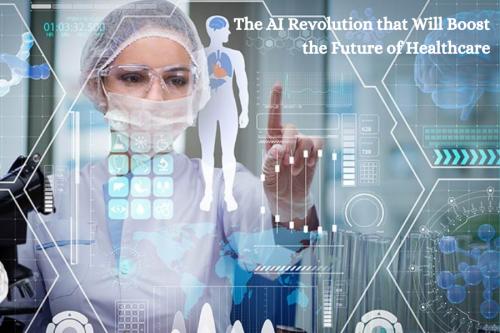Techno-Health: The AI Revolution that will Boost the Future of Healthcare

Technology is revolutionizing healthcare in numerous ways, transforming the industry to be more efficient, accessible, and personalized. Here are some ways in which technology is shaping the future of healthcare:
Telemedicine: Telemedicine allows patients to consult with healthcare providers remotely, using video conferencing and other digital communication tools. This has become particularly important during the COVID-19 pandemic, enabling patients to receive care without risking exposure to the virus.
Artificial Intelligence (AI): AI is being used in healthcare for a variety of purposes, including medical imaging, diagnosis, personalized treatment plans, and predictive analytics. AI algorithms can analyze large amounts of data to identify patterns and trends that may not be apparent to human clinicians, leading to more accurate diagnoses and better treatment outcomes.
Electronic Health Records (EHRs): EHR systems digitize patient medical records, making them easily accessible to healthcare providers and improving coordination of care. EHRs can also incorporate AI algorithms to help clinicians make more informed decisions based on a patient's medical history and other relevant data.
Remote Monitoring Devices: Wearable devices and sensors allow patients to monitor their health outside of traditional healthcare settings. These devices can track vital signs, activity levels, and other health metrics, providing valuable data to both patients and healthcare providers for early detection of health issues and ongoing management of chronic conditions.
Robotics: Robotics technology is being used in healthcare for tasks such as surgery, rehabilitation, and medication management. Surgical robots, for example, enable more precise and minimally invasive procedures, reducing recovery times and improving patient outcomes.
Genomics and Personalized Medicine: Advances in genomics and genetic testing are enabling personalized approaches to healthcare, allowing treatments to be tailored to an individual's genetic makeup. This can lead to more effective treatments with fewer side effects, particularly in the field of cancer treatment.
Blockchain: Blockchain technology has the potential to improve the security and interoperability of healthcare data, enabling secure sharing of patient information across different healthcare providers and systems while maintaining patient privacy.
Virtual Reality (VR) and Augmented Reality (AR): VR and AR technologies are being used in healthcare for purposes such as medical training, pain management, and patient education. VR simulations can provide realistic training scenarios for medical professionals, while AR applications can overlay digital information onto the real world to assist with surgeries and other medical procedures.
Healthcare Forms:
In healthcare, forms play a crucial role in collecting and organizing patient information, facilitating communication between healthcare providers and patients, and ensuring compliance with regulatory requirements. With the advancement of technology, digital forms are increasingly being utilized to streamline these processes and enhance efficiency in healthcare settings.
One key aspect where technology is transforming healthcare forms is in patient intake forms. Digital intake forms allow patients to fill out necessary information online before their appointment, reducing wait times and administrative burdens for both patients and healthcare providers. These forms can be customized to collect specific information relevant to each patient's visit, such as medical history, current medications, and insurance details, ensuring that healthcare providers have all the necessary information to deliver personalized care.
Furthermore, technology is facilitating the integration of electronic signature capabilities into healthcare forms, allowing patients to sign documents securely and conveniently from any device with internet access. This not only eliminates the need for printing, scanning, and faxing paper documents but also enhances security and compliance by providing a digital audit trail of all signed documents.
Overall, technology is playing a transformative role in shaping the future of healthcare, making it more efficient, accessible, and patient-centered. However, it's important to ensure that these technologies are implemented thoughtfully and ethically to maximize their benefits while minimizing potential risks and disparities.

Comments